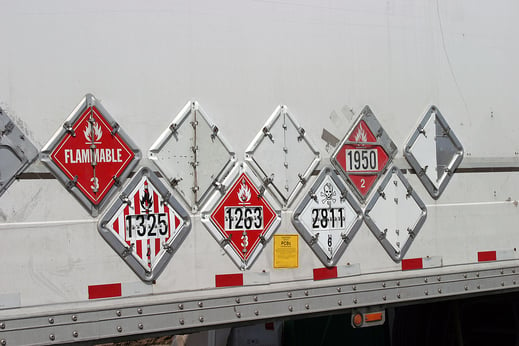Hazardous materials barreling down the highway in an 80,000-pound tractor trailer – what can go wrong?
Unfortunately, a lot can.
That’s why it’s imperative that the chemical trucking provider you select to haul your chemicals and hazmat products is a safe and compliant one. In this article, we identify key features that distinguish safe chemical trucking companies from the rest of the pack.
Key characteristics of a safe chemical transportation 3PL
1. A Commitment to Compliance
 At the forefront of safe chemical transportation is a company’s commitment to compliance. Key regulations that 3PLs need to comply with include the following:
At the forefront of safe chemical transportation is a company’s commitment to compliance. Key regulations that 3PLs need to comply with include the following:
- Driver Qualifications: Drivers transporting hazardous materials must have a Commercial Driver's License (CDL) with a Hazardous Materials Endorsement (HME). Additionally, they need to complete the Department of Transportation (DOT) training for hazardous materials handling, as outlined in Title 49 of the Code of Federal Regulations (CFR) and comply with the Transportation Security Administration (TSA) background checks.
- Environmental Protection Agency (EPA) Identification Number: This ID number tracks hazardous waste activities for regulatory compliance. It is required for companies who generate, transport, treat, store, or dispose of hazardous waste.
There are additional requirements for chemical transportation providers operating within California:
- Hazardous Materials Transportation License (HM License): Issued by the California Highway Patrol (CHP), this license is mandatory for any carrier transporting hazardous materials within the state.
- California Environmental Reporting System (CERS) Business Plan: Companies handling hazardous materials must file a Hazardous Materials Business Plan (HMBP) with CERS, detailing the types, quantities, and storage of hazardous materials on-site.
2. Expert Knowledge of Hazardous Materials
Every chemical is going to have its own Safety Data Sheet (SDS), a is a detailed document that provides information on the properties of a chemical substance or mixture. The purpose of the SDS is to provide both workers and emergency personnel with the proper procedures for handling or working with a particular substance.
However, the best trucking companies for hazardous materials have knowledge that extends beyond the SDS. They have first-hand experience with these chemicals and understand the commodities they are moving inside and out. From recognizing how different substances react to specific environmental conditions to ensuring that all safety measures are in place during transit, these companies ensure that their drivers and operational staff are well-versed in the safe handling of chemical and hazmat products.
3. Thorough Risk Management and Auditing
A key differentiator for safe chemical trucking companies is their approach to risk management. These companies conduct detailed risk assessments, often involving third parties or insurance companies, to ensure their operations meet the highest safety standards.
Auditing processes, both internal and external, also play a critical role in verifying the safety protocols and preparedness of the company. For example, in addition to the many federal and state audits that Weber Logistics undergoes as a chemical logistics 3PL, it also performs its own internal audits which are every bit as stringent as their regulatory counterparts. Nicknamed “Triple S Audits,” these internal audits are performed by a dedicated team and focus on the areas of Safety, Security and Sanitation.
Importantly, you can – and should –perform your own audit of your prospective 3PL partner’s operations to make certain that you are choosing the right partnership for your specific chemical products.
4. Temperature-controlled capabilities
Some chemical products are required to stay within strict temperature ranges and must be stored and transported in refrigerated and/or frozen environments. If your chemical products are temperature sensitive, then you need to ensure that your chosen 3PL has temperature-controlled trucking capabilities in addition to its chemical expertise.
And, if you are planning on transporting these types of products in California, you’ll need to ensure that your 3PL trucking provider is compliant with all the many regulations affecting trucks and reefer units within The Golden State. These include California Air Resources Board (CARB) regulations that enforce standards to reduce emissions from diesel-powered refrigeration units on trucks and trailers.
5. Ongoing Training and Industry Affiliations
Safety in chemical trucking also hinges on the continuous education and certification of the team. Companies that invest in regular hazmat training for their teams, while keeping up with changing regulations and ensuring compliance, are the ones that truly prioritize safety. This ongoing commitment to learning and certification safeguards against accidents and ensures that all personnel are prepared to manage emergencies.
Environmental and safety regulations are constantly changing in the chemical industry. Chemical 3PL providers need to remain active in industry groups to stay abreast of these changes. If they are not, it’s fair to question their commitment to serving chemical industry customers.
The Chemical Council of the International Warehouse Logistics Association, the National Association of Chemical Distributors, and the Warehousing Education and Research Council are just a few of the organizations that provide education on chemical storage and transportation practices.
Weber: a chemical trucking company that checks all the boxes
The transportation of hazardous materials is fraught with potential risks, but companies that excel in the above areas stand out as true leaders in this important industry. Safe chemical trucking providers not only protect their drivers and the communities they serve but also ensure the integrity of the materials they transport.
At Weber, we truly go the extra mile to uphold our clients’ trust. Our SOPs for chemical storage and handling comply with stringent regulatory requirements, so you are always “audit ready.” We are CFATS-compliant, are well versed in C-TPAT protocols, and our chemical handling processes have served as a model for the LA County Fire Department’s training program. To learn more about partnering with a true chemical logistics expert from the West Coast, contact Weber Logistics today.





 Capital Management
Capital Management